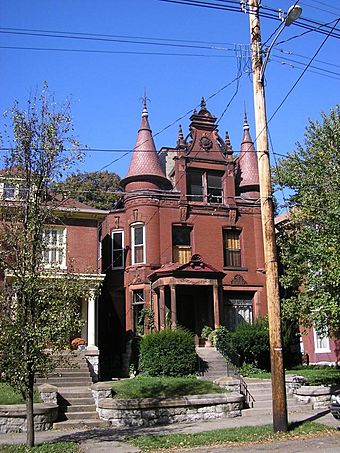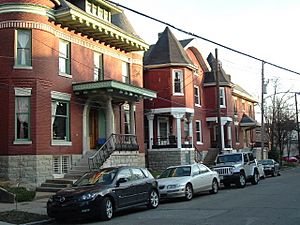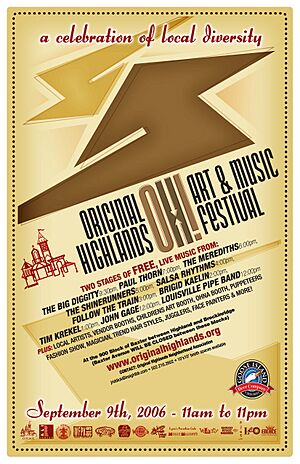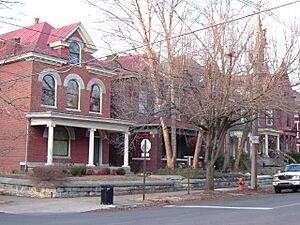Original Highlands, Louisville facts for kids
Quick facts for kids |
|
|
Highlands Historic District
|
|

An example of the elaborate home architecture found in the Original Highlands
|
|
| Lua error in Module:Location_map at line 420: attempt to index field 'wikibase' (a nil value). | |
| Location | Louisville, Kentucky |
|---|---|
| Architectural style | Late Victorian |
| NRHP reference No. | 83002680 |
| Added to NRHP | February 11, 1983 |
The Original Highlands is a cool historic neighborhood in Louisville, Kentucky. It's part of a bigger area called The Highlands. This neighborhood is known for its unique mix of old houses and fun places to visit.
Contents
A Look Back: History of the Original Highlands
The land where the Original Highlands now stands was first measured in 1774. It was given to a person named Colonial William Preston. After he passed away, his son, Major William Preston, and his wife moved there in 1814. They started a large farm called the "Briar Patch."
Growing the Neighborhood
In 1819, a new road was built called the Louisville and Bardstown Turnpike. Today, we know it as Bardstown Road. This road made it easier for people to move to the area. Before the American Civil War, the area was mostly farmland. Many German immigrants came to live here, and it was even called New Hamburg for a while.
The land was later passed down to Preston's daughter, Susan Preston Christy. Christy Avenue is named after her! In 1869, people started dividing the land into smaller pieces to build homes. This process is called "subdivision." Things really sped up in 1871 when a horse-drawn streetcar line was extended to Highland Avenue. This made it much easier for people to travel.
Most of the houses in the Original Highlands were built between 1860 and 1895. A lot of them, about 600, were built in just 11 years during that time! In 1891, Cherokee Park was created nearby, which made the area even more popular. By 1895, almost all the land was developed.
Why "Original Highlands"?
The area was first just called "the Highlands." This is because it sits on a high ridge between two parts of Beargrass Creek. This ridge is above the Ohio River flood plain, so it stayed dry. Today, there are eight other neighborhoods on the same ridge that are also called The Highlands. The name "Original Highlands" helps people know which specific neighborhood we are talking about.
Homes and Buildings: Architecture of the Area
The Original Highlands has a cool mix of different types of houses. You can see large, fancy Victorian houses made of wood or brick. Right next to them, you might find smaller, working-class homes called shotgun houses. This mix gives the neighborhood a unique look.
Life Today: Contemporary History
In recent years, many people who work in professional jobs have moved to the Original Highlands. They like it because it's close to downtown Louisville. It's also near busy streets like Baxter Avenue, Bardstown Road, and Barret Avenue. These streets have lots of art galleries, unique shops, and fun places to hang out in the evenings.
Did you know that National Products, a small factory in the neighborhood, makes more disco balls than any other factory in the world? That's a fun fact! The part of Baxter Avenue between Highland Avenue and Broadway is very popular. It's full of restaurants, shops, and art spots. Barret Avenue is also becoming a popular art area with many galleries.
Fun Events and Food
The neighborhood hosts the Original Highlands Art and Music Festival every September on Baxter Avenue. It features local and national music, plus art and vendor booths. The area is also home to the annual Highlands Louisville Halloween Parade, the Louisville Zombie Attack, and the Ancient Order of Hibernians St. Patrick's Day Parade.
The Original Highlands is also famous for its many restaurants. People often call it "Restaurant Row" because there are so many great places to eat!
Where is it?
The Original Highlands is bordered by East Broadway to the north, Bardstown Road/Baxter Avenue to the east, Rufer Avenue to the south, and Barret Avenue to the west.
Who Lives Here: Demographics
In 2000, about 1,580 people lived in the Original Highlands. Most residents are white, but it's a diverse neighborhood with people from many different backgrounds.
 | Charles R. Drew |
 | Benjamin Banneker |
 | Jane C. Wright |
 | Roger Arliner Young |




